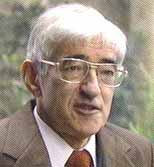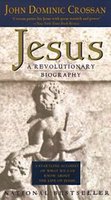
 This survey of Crossan's book, "Jesus, A Revolutionary Biography," is taking more time than I anticipated. My intention now is to pick a few examples of his conclusions, but give a general idea of the material from which I chose. This may result in a few less blogs.
This survey of Crossan's book, "Jesus, A Revolutionary Biography," is taking more time than I anticipated. My intention now is to pick a few examples of his conclusions, but give a general idea of the material from which I chose. This may result in a few less blogs.First, though, since I am not sure this biographical information was sent in a previous blog>>>
"John Dominic Crossan was born in Nenagh, Co. Tipperary, Ireland in 1934. He was educated in Ireland at Maynooth College, in Rome at the Pontifical Biblical Institute, and in Jerusalem at the Ecole Biblique."
Crossan was a member of the 13th-century Roman Catholic religious order, the Servites, from 1950 to 1969 and an ordained priest from 1957 to 1969.(I would like to add that Crossan left the Servites and the priesthood in 1969 because his all absorbing interest in discovering the historical Jesus was being made difficult by the Roman Catholic authorities. None of his books, probably, would have been allowed to be published if he had remained a Servite and a priest.)
"John Dominic Crossan is Professor Emeritus of Religious Studies, DePaul University, Chicago. He has written twenty books on the historical Jesus in the last thirty years, four of which have become national religious bestsellers: The Historical Jesus (1991), Jesus: A Revolutionary Biography (1994), Who Killed Jesus (1995), and The Birth of Christianity (1998). He is a former co-chair of the Jesus Seminar, and a former chair of the Historical Jesus Section of the Society of Biblical Literature, an international scholarly association for biblical study based in the United States."
-----
There are many cases of possession mentioned in the New Testament. What exactly were they?
Crossan believes that they were forms of mental and emotional illness. But, why so many? He believes "...there could be a connection between colonial oppression and form of mental illness easily interpreted as demonic possession...."
"In discussing Jesus's exorcisms, therefore, two factors must be kept in mind. One is the almost split-personality position of a colonial people. If they submit gladly to colonialism, they conspire in their own destruction; if they hate and despise it, they admit that something more powerful than themselves, and therefore to some extent desirable, is hateful and despicable. And what does that do to them? Another is that colonial exorcisms are at once less and more than revolution; they are, in fact, individuated symbolic revolution."
As I understand Crossan, there are more cases of mental and emotional illness and disturbance, including split personality, e.g. schizophrenia, in a people under the heel of an oppressor.
You probably remember the passage in Mark 5:1-17 in which Jesus meets a man possessed by an unclean spirit wandering among the tombs. The tormented man broke the chains the local people bound him in. He cried out in a loud voice: "What have you to do with me, Jesus, Son of the Most High God." Jesus showing compassion commanded the unclean spirit to leave the man. Jesus asked the spirit its name. "My name is Legion; for we are many." Jesus sent the unclean spirits into a herd of swine, about two thousand. The herd "rushed down the steep bank into the sea, and were drowned in the sea."
This story from Mark, Crossan believes "...was almost certainly created long after Jesus' life, maybe in the context of the First Roman-Jewish War of 66 to 73 C.E. (A.D.)"
"The demonic both one and many; is name Legion, that fact and sign of Roman power; is consigned to swine, that most impure of Judaism's impure animals; and is cast into the sea, the dream of every Jewish resister."

